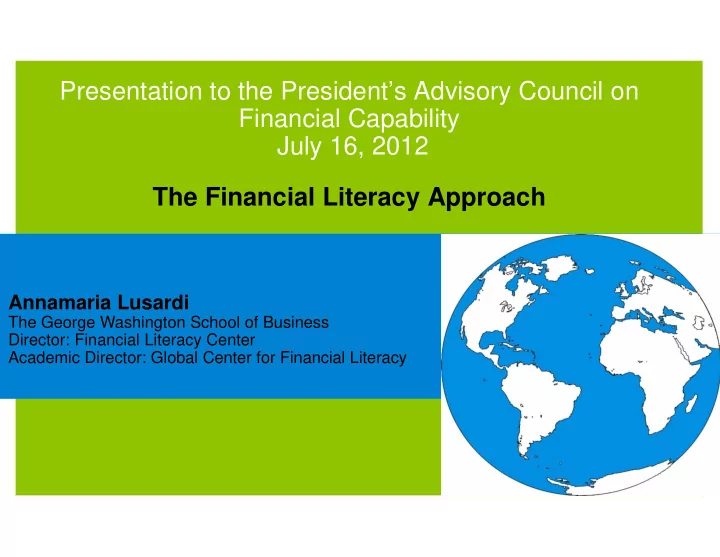

Presentation to the President’s Advisory Council on Financial Capability July 16, 2012 The Financial Literacy Approach Annamaria Lusardi The George Washington School of Business Director: Financial Literacy Center Academic Director: Global Center for Financial Literacy
Why is financial literacy relevant? A new economic landscape Major changes that increase individuals’ responsibility for their financial well-being Changes in the pension landscape • DC pensions and IRAs Changes in the labor markets • Divergence in wages – skills are critical • One of the most important decisions (invest in education) has to be made early in life Changes in the financial markets • More opportunities to borrow and large amounts
The financial literacy approach The financial literacy approach recognizes… That individuals have to make more decisions than in the past • Focus on the individual: he/she is the decision- maker That individuals have specific needs and economic circumstances • One size does not fit all That financial decisions are complex and interrelated • Financial literacy is a life skill • Limits to rules and regulation
What financial literacy promotes The study of individual behavior. How well-equipped are people to make decisions? Critically important to have data and promote data collection • US Financial Capability Study • OECD PISA: New module on financial literacy in 2012 Importance of qualitative work in addition to quantitative work • Need to have in-depth knowledge of individual behavior Importance of a multi-disciplinary approach • Learning from different fields, including behavioral economics
Most important data set to study literacy/capability The 2009 National Financial Capability Study It includes 3 surveys: 1. National Survey : Nationally projectable telephone survey of 1,488 American adults 2. State-by-State Survey : Online survey of approximately 28,000 respondents (roughly 500 per state + DC) 3. Military Survey : Online survey of 800 military personnel and spouses New wave ready to go into the field in Summer 2012
Programme for International Student Assessment (PISA) Are students well prepared for future challenges? Can they analyze, reason and communicate effectively? Do they have the capacity to continue learning throughout life? Every three years the OECD Programme for International Student Assessment (PISA) answers these questions and more. It assesses to what extent students near the end of compulsory education have acquired some of the knowledge and skills essential for full participation in society.
Results of financial literacy research What we have learned so far Financial literacy is very low across the population • Financial illiteracy is very widespread • Need to equip people to make financial decisions Mismatch between what people know and what they think they know • Problems of scams Some groups are particularly vulnerable: young, old, and women • Need for targeted programs Financial literacy and financial advice are complements
Results of financial literacy research (cont.) What we have learned so far Lack of planning for both the short and long run • Most have no rainy day savings • No planning for retirement or children’s education Limited information on terms of contract and limited search • Often people do not know the interest rates they are charged Reliance on high-cost methods of borrowing • Need to look at both asset and debt management
Where can financial literacy be successful? Ideal venues for financial education In schools • Easier to reach the young • Need a base on which to build In the workplace • Easier to reach the adults • Growing importance of DC pensions In libraries, local communities, museums • Where people go to learn
A Museum of Saving in Italy
Improving the effectiveness of financial education What research recommends Make it individual specific • People are different Make it relevant and engaging • Inertia and lack of attention Make it simple • Complexity is a barrier, particularly in the face of widespread financial illiteracy
Where is more research needed Need to know what works How to make programs more effective, including cost effectiveness • Insights from behavioral economics and psychology • Importance of decision aids How to reduce costs, including search costs • Many decisions are on individuals’ shoulders How to implement preventive measures • Some potential crises looming ahead
Final remarks The importance of financial literacy Financial literacy is like reading and writing • It is an essential skill, everyone has to deal with credit cards, DC pensions, investment in education, etc. • Imagine what a world with no education would look like It is essential for full participation in society • Citizens are asked to vote on economic reforms Ignoring the issue will be expensive for both individuals and society • Massive regulation or simplification may be needed to prevent mistakes
Final comment If you think education is expensive, try ignorance. -- Derek Bok (Former President of Harvard)
Recommend
More recommend